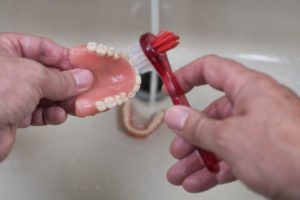
Dentures are a versatile and excellent solution for tooth loss because they fit many patients’ budgets and are removable, making them easy to care for! They’re also crafted from lifelike, customized materials that allow them to mimic the appearance of home-grown teeth. However, just like with your natural smile, over time your dentures can accumulate plaque, tartar, and food debris that leads to declining oral health and a bad odor. Read on to learn four ways you can keep your dentures healthy and prevent them from developing a smell.
Make Sure to Clean Your Dentures Properly
Your dentures should be thoroughly cleaned at least once a day to minimize the accumulation of bacteria on them and help fight the bad odor that can develop as a result. Be sure to use either special denture-cleaning products, like a denture brush and cleanser, or you can use a soft-bristled toothbrush and clear hand soap. Either way, you’ll want to avoid using any abrasive materials that could scratch them.
Be sure to also soak your denture overnight. You can do this in a special denture solution or saline. Lastly, make sure to never use hot water to clean your prosthetic—stick with cool and room temperature water to keep them from warping.
Always Rinse Them After You Eat
After every time you eat, whether it’s a snack or a meal, it’s crucial that you remove your dentures and rinse them under cool or room temperature water. This will help clear away any lingering food debris and prevent plaque from accumulating on them.
Visit Your Dentist Regularly
Even though you may not have any natural teeth, it’s still crucial to visit your dentist regularly to make sure that your dentures still fit properly and are functioning for you as they should be. Your dentist can also professionally clean your dentures, making sure to remove any built-up tartar and keep them looking like new!
Never Use Damaged Dentures
If your dentures become damaged at any point, even if they just have a small fissure or crack, it’s crucial to have them professionally examined and repaired. If you don’t, bacteria can build-up in these hard-to-reach cracks and cause your prosthetic to develop a bad odor. Additionally, the bacteria accumulation can put you at a higher risk of developing oral infections and gum irritation.
About the Author
Dr. Kostas has been in the dental field for over three decades and has loved every second of it! He enjoys getting to know his patients and helping them address problems that seriously impact their emotional wellbeing and oral health, like tooth loss. He has achieved Fellowship status with the American Dental Implant Association and offers start-to-finish implant dentures as well as traditional full and partials. For questions or to schedule a consultation, visit Complete Dental Care’s website or call 781-272-0441.







